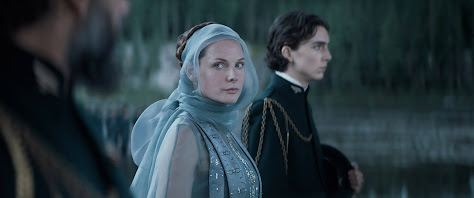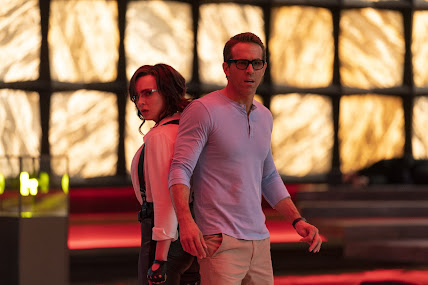Spoiler-free!
The most immediate thought that springs to mind when I think of how to break down Denis Villeneuve's adaptation of Dune into something that can qualify how I recommend it, is that it's a movie for fans. It doesn't gatekeep; anyone can be a fan. But you must be willing to invest, and to pay attention. If it does its job right, it will bring the uninitiated into the fold, and endow satisfied customers with a desire for more—whether that comes in book form or in eagerness for a sequel. But no matter if you came as a fan, or are made into one by the experience, casual viewing is the riskiest way of journeying into Dune's vast, sandy landscape.
 |
| I find it all a bit overwhelming even after reading the book and watching the '84 film (twice.) |
If you're not willing to invest the mental energy it takes to remember all the weird scifi names and terms, keep track of the medieval space politics, or care about characters who don't see their journey's end by the time the credits roll, then the only thing you're likely to get out of this film is a treat of big-budget visuals portraying the immense, looming and extreme fictional world. That alone is worth witnessing once, so I guess my recommendation is won. Still, with Villeneuve directing, great visuals were a shoo-in. My fear was that focus would be put on the wow-factor to the point where story and characters would suffer from boredom or pretentiousness. But no. Conversation drives the story, yet I wasn't bored for one second. And visual awe is turned up to the max, with dedication to relaying the character side of things keeping easily in stride.
My biggest worry of all was the casting of indie darling Timothée Chalamet as the film's lead. I know he's an actor who actually puts stock into acting but there's no predicting my reaction to his roles and performances. And a Paul who comes across wrong is a fatal flaw. I was skeptical. But he proves to be a good casting choice, portraying an accurate Paul who is neither bland nor annoying. He reminded me of the book version and gives a lot, even through Villeneuve's style of preferring to film his characters still and stoic. Once I wasn't worried about the lead anymore, I knew I was in for something good, but the movie doesn't stop there.
 |
| Though it's giant, it's dedicated down to the details. |
Rebecca Ferguson is a force as Lady Jessica, as she should be; everything always bubbling just under her surface, always strong; always on the edge of breaking down. She walks a beautiful line. From the outset she was my favorite casting decision and that holds. Her elegant but worn looks are perfect for the part. She's captivating. Oscar Isaac works in a role that's probably difficult to correctly balance. Stellan Skarsgård's ominously droll voice and face pairs with the intimidating character design of the villain to great effect. Jason Momoa is a surprise standout for me, his charismatic energy a welcome highlight against his subdued surroundings. Josh Brolin biding his time in my favorite book character; Javier Bardem is in full character acting mode; Zendaya has the right amount of grounded girlishness. Characters I confused with others in the book have clear personalities and outstanding looks to help differentiate. The cast is near-perfect.
The only cast member who doesn't fit into the subtle but refined vibe is Dave Bautista, whose character can be summed up as "angry" and who passively yells his lines to convey that single dimension. This is a small negative, though there aren't many more that could be called bigger. Mostly, I wished for more, though I realize that's an unreasonable ask considering the film is two and a half hours long. I wish they could have included the whole of the first book without cutting out anything or increasing the epic, steady pace (which felt to me like watching a massive river or flood flowing from a high distance—beautiful and serene even with the obvious turmoil and force on display). I think Villeneuve chose the lesser of the evils and I hope it pays off.
 |
| The scale conveyed is so enormous it's a little hard to grasp. |
This is my personal favorite work from Villeneuve, though I have never considered myself a huge fan. Part of me knows his penchant for enormous scale, robust scifi worldbuilding, and calculated way of storytelling makes him ideal for trying such a difficult piece of adapting. At the same time, I've never been deeply moved by his work. And the same is true here. Seeing the scale of the world, and seeing the book transposed so cleanly to the screen, made me smile, but it didn't bring me to love the story or characters any more. The book didn't bring much emotional attachment either, so maybe it's simply not that kind of story. But a small part of me wonders if the neatness of the work, and the cool, stoic style, are holding me back from tipping from this pleased admiration into something more freely adoring.
How much more astounding would this movie be if it could be everything it is, plus be wild, visceral, and psychedelic? Still, I don't want to complain. Dune had me smiling, enraptured, and dreading it ending—which it did far too soon. It was clearly thoughtfully adapted, keeping everything from the book it could while expanding it in some details, such as the vibrating, liquefying sand under the sandworms' attacks. I loved that. I loved the way The Voice is portrayed, as well as the way the book's heavy inner dialogue is adapted without the characters having literal inner dialogues. The plot was clear. The characters were given room to breathe and grow and the actors given opportunities to break out of the stoicism to have a bit of fun or bring extra intensity. And the special effects are so good I can't differentiate in-camera effects from CGI.
 |
| I don't care about fight or action scenes but there were several good ones of those, too. |
I have a growing list of favorite scenes, moments, and little details, and have as much a desire to see this again (which I will, probably before I post this) as I do to see what the sequels have to hold. Dune is expansive, grand, and epic filmmaking on an unreal scale. An alien behemoth that can be approached from many angles, but my recommendation is simply that you let it sweep you along in its vast currents of sand to see the mesmerizing world it proudly and boldly puts on display for our appreciation. At the very, very least, it's an impressive and skillful craft of filmmaking.



